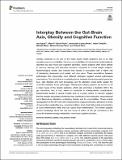Por favor, use este identificador para citar o enlazar a este item:
http://hdl.handle.net/10261/195501COMPARTIR / EXPORTAR:
 SHARE SHARE
 CORE
BASE CORE
BASE
|
|
| Visualizar otros formatos: MARC | Dublin Core | RDF | ORE | MODS | METS | DIDL | DATACITE | |

| Título: | Interplay between the gut-brain axis, obesity and cognitive function |
Autor: | Agustí, Ana CSIC ORCID; García-Pardo, María Pilar; López-Almela, Inmaculada; Campillo, Isabel CSIC; Maes, M.; Romaní Pérez, Marina CSIC ORCID; Sanz Herranz, Yolanda CSIC ORCID | Palabras clave: | Microbiota Behaviour Obesity Mood Cognition |
Fecha de publicación: | 2018 | Editor: | Frontiers Media | Citación: | Frontiers in Neuroscience 12 (2018) | Resumen: | Obesity continues to be one of the major public health problems due to its high prevalence and co-morbidities. Common co-morbidities not only include cardiometabolic disorders but also mood and cognitive disorders. Obese subjects often show deficits in memory, learning and executive functions compared to normal weight subjects. Epidemiological studies also indicate that obesity is associated with a higher risk of developing depression and anxiety, and vice versa. These associations between pathologies that presumably have different etiologies suggest shared pathological mechanisms. Gut microbiota is a mediating factor between the environmental pressures (e.g., diet, lifestyle) and host physiology, and its alteration could partly explain the cross-link between those pathologies. Westernized dietary patterns are known to be a major cause of the obesity epidemic, which also promotes a dysbiotic drift in the gut microbiota; this, in turn, seems to contribute to obesity-related complications. Experimental studies in animal models and, to a lesser extent, in humans suggest that the obesity-associated microbiota may contribute to the endocrine, neurochemical and inflammatory alterations underlying obesity and its comorbidities. These include dysregulation of the HPA-axis with overproduction of glucocorticoids, alterations in levels of neuroactive metabolites (e.g., neurotransmitters, short-chain fatty acids) and activation of a pro-inflammatory milieu that can cause neuro-inflammation. This review updates current knowledge about the role and mode of action of the gut microbiota in the cross-link between energy metabolism, mood and cognitive function. | URI: | http://hdl.handle.net/10261/195501 | DOI: | 10.3389/fnins.2018.00155 | Identificadores: | doi: 10.3389/fnins.2018.00155 issn: 1662-453X |
| Aparece en las colecciones: | (IATA) Artículos |
Ficheros en este ítem:
| Fichero | Descripción | Tamaño | Formato | |
|---|---|---|---|---|
| fnins-12-00155.pdf | 1,38 MB | Adobe PDF |  Visualizar/Abrir |
CORE Recommender
PubMed Central
Citations
107
checked on 18-abr-2024
SCOPUSTM
Citations
184
checked on 12-abr-2024
WEB OF SCIENCETM
Citations
164
checked on 26-feb-2024
Page view(s)
243
checked on 17-abr-2024
Download(s)
182
checked on 17-abr-2024

